How a one-of-a-kind business has kept 5,000 kitchens out of landfills
Ordinarily, you’d probably have no interest in my kitchen renovation project. It’s a common story: The kitchen is nearly 20 years old and starting to fall apart, we’re readying the house for an eventual sale, blah blah blah.
What makes it fascinating was how we got rid of it.
Most people throw their old kitchens into dumpsters, which takes all of it to the landfill: cabinets, countertops, appliances. Sometimes your contractor may take pieces off your hands; sometimes you can get Habitat for Humanity to take pieces of it. But mostly, it’s landfill.
But we stumbled onto a much better approach, in the form of a company called Renovation Angel. There’s only one company like it in the country, and its business model is astonishingly airtight:
They send a crew to dismantle, wrap, and haul away your old kitchen, piece by piece, for free. You’re saved the cost of the demolition ($5,000 or so), dumpster rental, and disposal fees. Then they then give you a huge tax deduction. Winner: You.
They set up your kitchen’s components in a 43,000-foot showroom in New Jersey, where they then resell your entire kitchen! Other people who are renovating their kitchens get luxury stuff for a fraction of its usual price—maybe 10% or 20% of its original cost. Winner: The next owner of your kitchen.
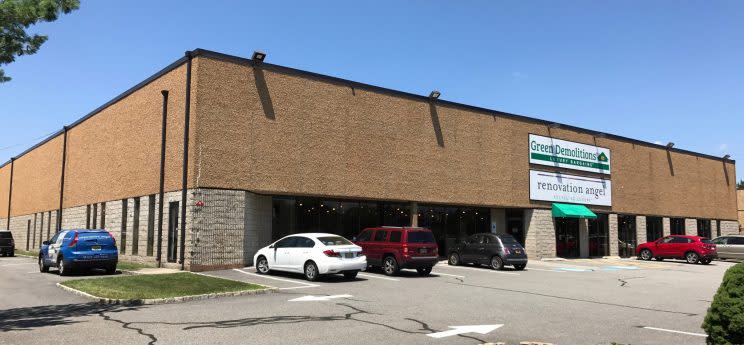
Over 12 years, this operation has saved 5,000 kitchens from the landfill. Winner: The planet.
The company employs 35 people. Winner: Renovation Angel’s employees.
The best part: After expenses, Renovation co-founder Steve Feldman donates the rest of the company’s income to charity—$2.2 million so far. Winners: At-risk children, recovering addicts, job trainees.
This is, in other words, a win-win-win-win-win scenario.
But does it work?
I love that that this idea has something for both hard-nosed conservatives (“I’ll take that $25,000 tax deduction, thank you”) and bleeding-heart liberals (“Save the environment and help the less fortunate? Sign me up!”) But I’ll just say it: All of this sounded too good to be true.
So I emailed the company. They sent a guy out to look over the kitchen, measure, take photos, and assess its resale value. The economics of this company work out, Feldman says, only if he resells upscale kitchens; at the moment, Renovation Angel accepts only about half of the candidate kitchens.
Our kitchen made the cut. So on the appointed day, a crew of four men—insured, background-checked—spent about four nonstop hours taking the old kitchen apart. (Incredibly, this was their second kitchen of the day.)
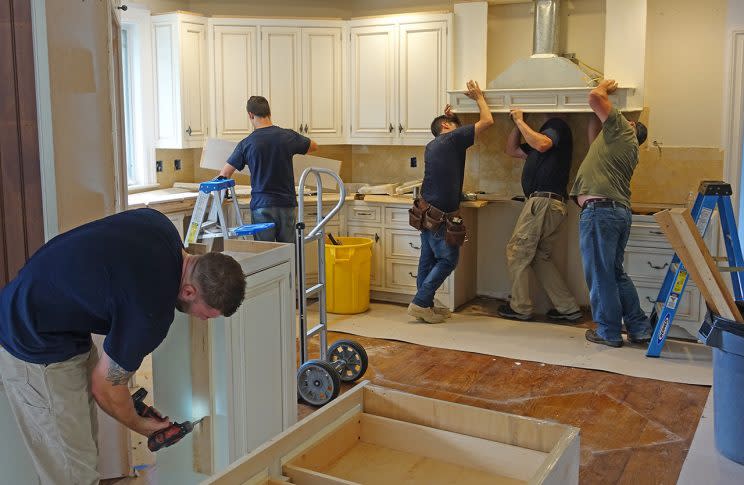
The term for this process is demolition, but no destruction was involved. Instead, they carefully unscrewed every piece, wrapped it for protection, and loaded it into a moving truck parked outside. It was amazing to watch, especially in time-lapse (see my video above)
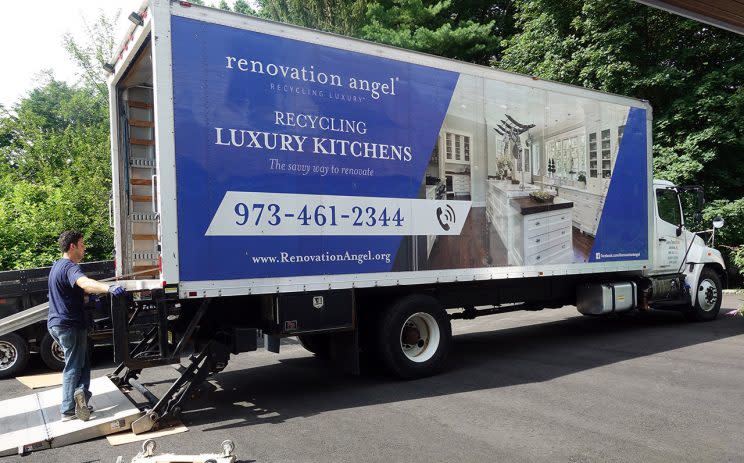
To get the tax deduction, I had to hire an appraiser; but that was my only expense. (I guess that means that somebody else wins from all of this.)
A week later, I visited the Renovation Angel showroom to interview Feldman—and there, among all the other kitchens stacked up for sale, were all the pieces of my own beloved kitchen, ready to move on to a new home. I even saw a New Jersey couple checking it out.
That’s the part I didn’t get. How can someone buy a kitchen from a totally different house? What are the odds that it will fit their kitchen space?
“Everybody has this question,” Feldman says. “The answer is, kitchens are modular. So if you had a 20 by 15-foot space, somebody else might have a 12 by 20 space. They use a few less cabinets. They rearrange them differently. They get different granite. But at the end of the day, they’re saving themselves tens of thousands of dollars.”
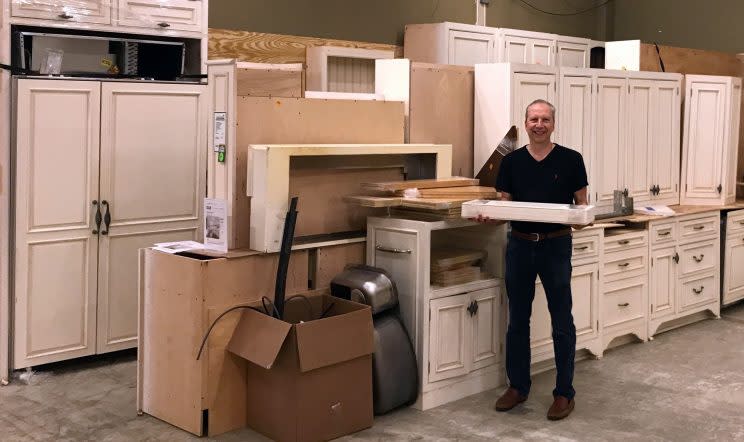
Steve’s story
Confusingly, at least to me, Renovation Angel is the name of the demolition side of the company; the part that resells the kitchens is called Green Demolition. It’s the Green Demolition site that lists kitchens for resale.
Feldman, the creator of both halves, has quite a life story. He was an alcohol and drug addict from his teen years right through his career as a radio executive, working for “Imus in the Morning.” He credits a drug-rehab program for saving his life when he was 30. “I’m a recovered addict for 29 years,” he says now.
About 12 years ago, he saw a 10,000-square-foot house in Greenwich, Connecticut, being demolished—and watched all the fine marble, custom cabinetry, and expensive appliances get tossed into a dumpster.
“And I see a sign in the driveway, and it says, ‘Demolition in progress.’ And I think, what’s this? So I drive up to the mansion, and it’s gone. Just a pile of rubble. And I have this ‘Aha!’ moment: Maybe I can earn money by selling kitchens and beautiful fixtures out of mansions.”
When the local Greenwich newspaper wrote an article about this idea, Feldman got 36 phone calls from hedge fund managers, architects, builders, and designers—and the company was on its way.
Today, the company recycles about 500 kitchens a year, and has started to reclaim furniture and fixtures from other rooms of the house. Renovation Angel crews can rescue kitchens from anywhere in the country; eventually, Feldman hopes to open showrooms in California and Florida.
His backstory, by the way, accounts for Feldman’s decision to turn over the company’s profits to charity. “I got my life given back to me [by one of these social programs], and I’m motivated for the rest of my life to give back.”
Storied kitchens
It’s fun to walk through the enormous Renovation Angel showroom, because Feldman is bursting with the stories behind these kitchens.
“We went into one of the biggest mansions in North Las Vegas,” he says. “The kitchen had only been used 25 times. It was a $400,000 kitchen, but it was forest green. It wasn’t the color that most people want. The kitchen designer told me that kitchen would have been thrown out if we hadn’t reclaimed it.” In the end, Feldman says, “a woman in Johnson City, Tennessee bought it for $62,000, because her house had recently burned down.”
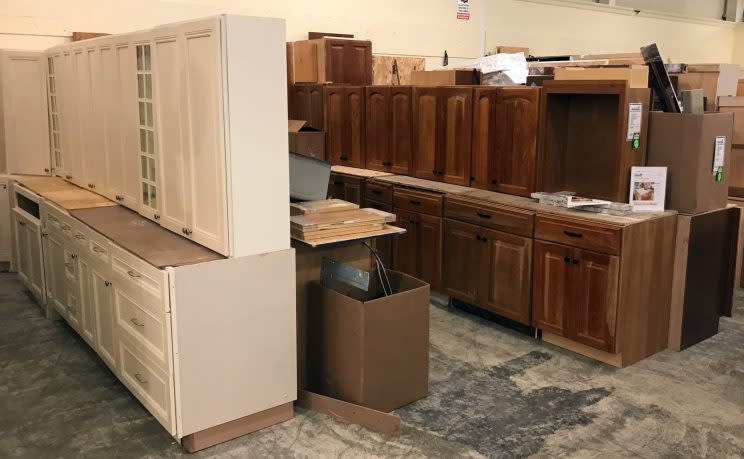
At one point, he says, he acquired a kitchen worth $630,000, although it included 15 rooms’ worth of millwork (doors and trim). “A guy ordered it in LA, his Ponzi scheme got bankrupted, and it all sat in a warehouse. I found a dentist to buy the whole lot for $125,000. It was a good deal for everybody.”
Feldman says he also gets kitchens from manufacturers and designers where parts were mis-ordered. “One designer ordered the wrong color on a kitchen—a $127,000 kitchen. The homeowner said, ‘This is the wrong color—order me the right color!’ So she brought this kitchen here, and we sold it.”
One of a kind
“All right, let me play the role of a viewer,” I finally asked Feldman. “It’s like, oh, OK, so people like Pogue get a huge tax write-off and free removal of the old kitchen. The landfill wins. Charities win. Future buyers win. It sounds a little too good to be true. Somebody here is losing.”
“Well, the risk is on our organization,” Feldman replied. “It’s a ton of labor. We do a lot of overtime. And it’s a lot of complicated logistics to coordinate, from the removal to the transportation to the unpacking to the selling to the delivering. That’s why the kitchen industry never had a recycle or trade-in component: because it’s difficult, and it’s space-consuming, time-consuming risk. They want to focus on selling new. So the opportunity is left for us.”
I just couldn’t see who doesn’t come out ahead in Renovation Angel’s system. Feldman insists that the answer is, nobody. “Nobody loses,” he says. “Nobody! You know why? Because it would otherwise go to a landfill. The loser is when you put your kitchen in the dumpster.”
More from David Pogue:
Is through-the-air charging a hoax?
Electrify your existing bike in 2 minutes with these ingenious wheels
Marty Cooper, inventor of the cellphone: The next step is implantables
The David Pogue Review: Windows 10 Creators Update
David Pogue’s search for the world’s best air-travel app
The little-known iPhone feature that lets blind people see with their fingers
David Pogue, tech columnist for Yahoo Finance, welcomes nontoxic comments in the comments section below. On the web, he’s davidpogue.com. On Twitter, he’s @pogue. On email, he’s poguester@yahoo.com. You can read all his articles here, or you can sign up to get his columns by email.

